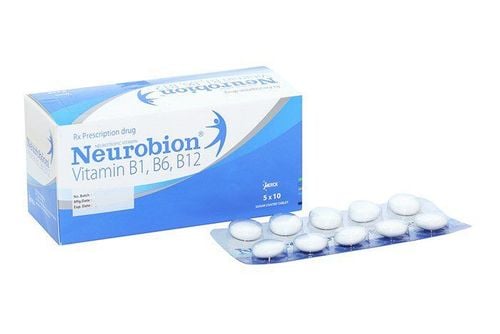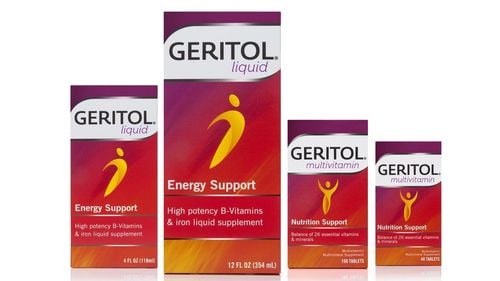Neurobion is the name of a medication containing high doses of three neurotropic vitamins: B1, B6 and B12. These vitamins play an essential role in the metabolic processes of both the central nervous system (CNS) and the peripheral nervous system (PNS). So, what is Neurobion and what should be noted when using it?
1. What is Neurobion?
Neurobion is a medication produced by PT. Merck Tbk, and its main ingredients include three types of vitamins: B1, B6, and B12. These vitamins are known as neurotropic vitamins with the following benefits:
- Vitamin B1: Plays a crucial role in metabolic processes.
- Vitamin B6: Helps alleviate nerve pain.
- Vitamin B12: An essential component in the production of red blood cells and helps prevent degeneration of the nervous system.
Neurobion is formulated in two forms: coated tablets and injectable ampoules:
- Neurobion coated tablet form: The tablets are round, white, and bilayered, with each tablet containing 100 mg of Vitamin B1, 200 mg of Vitamin B6, and 200 mcg of Vitamin B12. Additionally, Neurobion is packaged as follows: a box containing 5 blister packs, each blister containing 10 coated tablets.
- Neurobion injectable vial form: Each vial contains 100 mg of Vitamin B1, 100 mg of Vitamin B6, and 1000 mcg of Vitamin B12.

2. What is the effect of Neurobion?
What is the effect of Neurobion? This medication is commonly prescribed by doctors for the following conditions:
- Various peripheral neuropathies that can be influenced by the three vitamins, including: polyneuropathy, neuralgia, sciatica, lumbago (lower back pain), shoulder-arm syndrome, intercostal neuralgia, trigeminal neuralgia, numbness in the extremities,...;
- Supportive treatment for nerve pain relief;
- Diabetic polyneuropathy, neuropathies induced by certain medications, or alcohol-related neuropathy;
- Supportive treatment for joint pain relief.
- Disorders caused by deficiencies of Vitamin B1, B6, and B12, such as beriberi, iron-deficiency anemia, and seizures in children due to pyridoxine deficiency.
- Neurobion injectable vials are indicated in the treatment of herpes zoster (shingles).
3. Pharmacodynamics and pharmacokinetics of Neurobion
All three vitamins B1, B6, and B12 play important roles in the normal metabolic processes of nerve cells. The combination of these three vitamins in Neurobion has been shown to enhance the therapeutic effect compared to using each vitamin individually.
In Neurobion, Vitamins B1, B6, and B12 not only exert their individual activities but also interact with each other through biochemical links, thereby providing significant benefits in the metabolism of the nervous system. This synergy further reinforces the superior therapeutic effectiveness of the combination formulation of these vitamins in Neurobion.
Some animal studies have shown that the combination of B vitamins supports the faster recovery of nerve fiber damage, while also enhancing functional recovery and strengthening muscle tissue.
In certain pain-related conditions in mice, studies have demonstrated that the combination of Vitamin B1, B6, and B12 effectively alleviates pain, with a more potent effect compared to the use of individual vitamins alone. Additionally, electrophysiological experiments have shown the direct effects of B vitamins on pain transmission pathways in the spinal cord and thalamus, which explains the observed reduction or loss of pain sensation in clinical patients.
From a pharmacokinetic perspective, studies indicate no evidence that the combination of Vitamins B1, B6, and B12 adversely affects the pharmacokinetics of each individual vitamin.
4. Dosage and Administration of Neurobion
Dosage of Neurobion for adults:
- Coated tablets: Used for mild to moderate cases or during intervals between injections. The specific dosage is 3 tablets per day, divided into 3 doses.
- Injectable vials: Indicated for severe cases with a dosage of 1 vial per day until symptoms begin to improve. Afterward, the dosage can be reduced to 2-3 vials per week.
- Dosage of Neurobion for children: This medication is not suitable for young children due to the relatively high content of vitamins.
Some important notes on the dosage and administration of Neurobion:
- The duration of treatment depends on the severity of the condition and the patient's response, or as prescribed by the doctor.
- For the coated tablet form, the patient should take the tablet with plain water, either before or after meals, and must not crush or chew the tablet.
- The injectable form of Neurobion should be administered by a healthcare professional via intramuscular injection.
- Patients must strictly follow the doctor's instructions, not self-adjust the dosage, and should not stop the medication without the doctor's approval

5. What are the side effects of Neurobion?
Vitamins B1, B6, and B12 are water-soluble, and as such, when absorbed into the body, they are excreted via the kidneys. According to current statistics, cases of unwanted side effects are very rare.
However, in a small number of cases, individuals using Neurobion may experience nausea, abdominal discomfort, diarrhea, or allergic reactions such as rashes, hives, itching, redness, blistering, and peeling skin. In severe cases, this may be accompanied by sweating, shortness of breath, chest pain, hoarseness, facial swelling, and fever.
Prolonged use of Vitamin B6 (over 2 months) at high doses exceeding 1g/day can lead to severe peripheral neuropathy, with symptoms including unsteady gait and numbness in the hands and feet. Although this condition may improve once the medication is discontinued, it may still leave some lasting effects.
If the patient experiences any unwanted side effects during treatment, they should discontinue the medication and promptly inform their doctor or go to the nearest medical facility for timely management.
6. Some considerations when using Neurobion
Some contraindications for the use of Neurobion include:
- A history of allergy or hypersensitivity to any of the ingredients in the medication.
- Malignant tumors.
- Caution is required when using Vitamin B6 concomitantly with Levodopa (a medication used to treat Parkinson's disease).
For special populations such as pregnant or breastfeeding women, the use of Neurobion is generally allowed. However, pregnant women using high doses of Vitamin B6 over an extended period may risk causing drug dependence syndrome in newborns. Additionally, Neurobion can be excreted into breast milk, and while the risks of overdose in newborns are not yet clear, high doses of Vitamin B6 (over 600mg per day) may cause a reduction in or cessation of breast milk production.
Some drug interactions of Neurobion include:
- Levodopa: Its effectiveness is reduced when used concomitantly with Vitamin B6.
- Pyridoxine: Can decrease the effectiveness of Vitamin B6.
- Loop diuretics (furosemide): Long-term use of these with Neurobion may reduce thiamine levels in the blood.
Neurobion is a medication that contains high doses of three neurotropic vitamins: B1, B6, and B12. To ensure its effective use and avoid any unwanted side effects, patients should carefully read the instructions and consult a healthcare professional before use.
To arrange an appointment, please call HOTLINE or make your reservation directly HERE. You may also download the MyVinmec app to schedule appointments faster and manage your reservations more conveniently.








